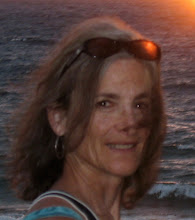 At the very least, The Reader is a love story. It begins when Michael Burk (David Kross) is 15 and Hanna Schmitz (Kate Winslet) is in her mid-thirties. Set in Germany about ten years after the end of World War II, the story progresses in time, but flashes back to earlier scenes throughout the story.
At the very least, The Reader is a love story. It begins when Michael Burk (David Kross) is 15 and Hanna Schmitz (Kate Winslet) is in her mid-thirties. Set in Germany about ten years after the end of World War II, the story progresses in time, but flashes back to earlier scenes throughout the story. The Reader addresses themes of love, justice, duty, and morality--all intermeshed. There is no clear path, no obvious resolution of how the characters, or we as the audience, should feel. We are introduced to these themes with the affair between Michael and Hanna. "Kid," she calls him.
Although many of us would likely question the morality of such a relationship between a boy and mature woman, it's nearly impossible not to see the strangely innocent beauty of their liaison. Hanna introduces Michael to his own sexuality, but it is also through her that he begins to experience and understand romantic love. Her love and attention spark a newfound confidence in him. He blossoms through his affair with her. So it is not simply the sexual hunger of a boy discovering his manhood under the steady guidance of a beautiful woman; but rather a boy becoming a man through the emotions he feels for her.
Transcending the limitations of his youth, Michael is able to give Hanna something more important than his body. He reads to her, imparting worlds that go far beyond the limitations of her abilities, her knowledge, and her experiences. He reaches emotions that are buried deep in her. He sees all this, quietly, and like so many things about her, he accepts it. But there is so much unsaid between them, so much about her he doesn't understand.
The story unfolds as a series of profound and provoking dilemmas. We are given the fascinating opportunity to consider what judgments we would make of situations that have no clear-cut answers. Interestingly enough, Michael's (Ralph Fiennes) profession as an adult is that of judge. So his dilemma in making judgment is compounded by the possible conflict between what constitutes the judicial (and even moral) "right" and what his own emotions will or will not allow him to feel.
Even love can be a moral dilemma, as we see in the relationship between Hanna and Michael. When someone you love acts in a way that is contrary to the very essence of what you believe to be true and just, can you continue to love that person. And if you do, can you forgive yourself for it?
Germany faces continuing haunts and collective guilt from the war--the horrors of the death camps, the lasting imprint of a time when even the most unspeakable crimes were attributed to the credos of duty and following orders. Blind obedience in the face of moral dilemma. When Hanna is being tried in a courtroom, she asks her judge, "What would you have done?" And we find ourselves, almost embarrassedly, trying to answer that question for ourselves. And we acknowledge that perhaps we may not have acted any differently than the accused.
Directed magnificently by Stephen Daldry, The Reader is the kind of film that stays with you and grows more beautiful with time--its loveliness and sad poignancy unfolding like the infinite petals of a rose. And such was Ms. Winslet's performance. The depth and raw truth she brought to this performance are surely worthy of an Oscar. Both Grouse and Fiennes turn in stellar performances as Michael. But Grouse's sensitive and persuasive performance as the young Michael deserve special praise. He develops quite convincingly from age 15 to early 20s. And his ability to convey such subtle differences in demeanor and facial expression as he grows older and more knowledgeable are a testament to his craft.


